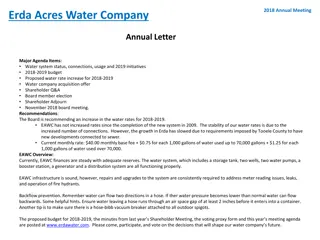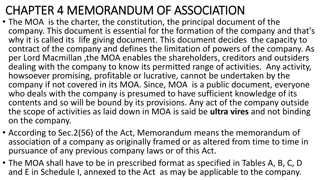
Types of Companies: Classification and Characteristics
Explore the classification of companies based on registration, liability, membership, ownership, nationality, and control. Learn about different types such as Chartered Companies, Statutory Companies, Limited by Shares, Private Companies, and Public Companies. Understand the characteristics of private companies, including voluntary association, share capital, and limited liability.
Download Presentation

Please find below an Image/Link to download the presentation.
The content on the website is provided AS IS for your information and personal use only. It may not be sold, licensed, or shared on other websites without obtaining consent from the author. If you encounter any issues during the download, it is possible that the publisher has removed the file from their server.
You are allowed to download the files provided on this website for personal or commercial use, subject to the condition that they are used lawfully. All files are the property of their respective owners.
The content on the website is provided AS IS for your information and personal use only. It may not be sold, licensed, or shared on other websites without obtaining consent from the author.
E N D
Presentation Transcript
KINDS OR TYPES OF COMPANIES
A. Classification of Companies from the point of view of incorporation or registration. B. Classification of Registered companies on the basis of liability of the Members. C. Classification of Registered companies with Share Capital on the basis of the number of Members. D. Classification of companies on the basis of ownership. E. Classification of companies on the basis of Nationality. F. Classification on the basis of control.
A) Based on Incorporation or registration : 1.Chartered Companies: Company Which comes into existence a special charter issued by king or queen 2.Statutory Companies: Company which is incorporated under a special or separate act of the legislature. 3.Registered companies: Where companies incorporated under the Companies Act.
B) Based on the liability of the Members: 1.Companies Limited by Shares: Which the liability of a member is limited to the nominal or face value of the shares held by him. 2.Companies Limited by Guarantee companies: The liability of each member is limited to fixed to the amount which he is guaranteed. 3.Unlimited companies: In which liability of the members is unlimited.
C) Based on the Number of Members 1.Private companies: A Company limited by shares, or a company limited by guarantee or unlimited company. Restricts the right of its members to transfer shares. Limits the number of members to 200. Prohibits any invitation to the public to subscribe its shares or debenture. .
Characteristics Of Private Company Voluntary association Share capital Membership Incorporated association Artificial person created by law Separate legal entity Formed for specific objects Prohibits invitation to the public Restricts the right to transfer of shares Limited liability Perpetual existence Separation of ownership from management
2) Public company: Which is not a private company. Which has at least 7 members Which has no maximum limit to the number of members. Which has a minimum paid up share capital 500000 Which can invite the public to subscribe to its shares or debenture. Which, generally, does not restrict the right of its members to transfer shares.
Difference between private company and public company Purpose Formation Private company Formation of the company is easy It just requires just one certificate i.e. certificate of incorporation from register of companies. Public company Formation of company is difficult It requires two certificate i.e, certificate of incorporation and certificate of commencement of business from the register of companies. It can commence business only after obtaining the business commence certificate. Must file the prospectus with the register of commencing before allotting shares. Certificates required Commence of business Can commence business immediately after incorporation. Prospectus No need to file prospectus with register of company
Name of the company Name of the company must end with the words Private Limited Name of the company must end with the words Limited Number of members Minimum: 2 Maximum: 200 Minimum capital for private company 100000. Minimum:7 Maximum: unlimited Minimum capital for private company 500000 Minimum paid-up share capital Invitation to the public to subscribe Company cannot invite the public to subscribe to its shares or debenture. Company can invite the public to subscribe to its shares or debenture. Transfer of shares The shares of private company are not freely transferable. The shares of public company are freely transferable. Appointment of directors All the directors may be appointed by a single resolution. Each director has to be appointed by a separate resolution. Retirement of directors by rotation Need not retire by rotation every year Must be retire by rotation every year.
Types of shares A private company can issue three types of shares i.e., preference shares, equity shares and deferred shares. It enjoys certain special privileges. A Private company need not maintain a separate index of members A Public company can issue only two types of shares. i.e., equity shares and preference shares. It does not enjoy any special privileges. A Public company must maintain a separate index of members, when its membership exceeds 200. In the case of public company the notice of general meeting must be of 21 days. Special privilege Index of members Length of notice of general meeting. In the case of a private company the notice of general meeting may be shorter than 21 days. In the case of private company, the minimum number of directors is two Minimum number of Directors. In the case of a public company, the minimum number of directors is three.
D) Basis of Ownership: 1.Government company: Company in which at least 51% of the paid up share capital is held by the Government. 2.Non-Government Company: Company which is owned and managed by private investors.
E) Basis on Nationality: 1.Domestic company: Company which is registered or incorporated in India 2.Foreign company: Company which is in corporated outside India but has a place of business in India 3. FERE/FEMA Company: Foreign Exchange Regulation Act Company is a company in which foreign residents hold more than 40% of its equity share capital.
F) Basis of Control: 1.Holding Company: Company which holds more than 50% of the nominal value of the equity share capital of another company 2.Subsidiary Company: Company which is controlled by a holding company.
Other types of company a. Family Company : It is a company in which one man holds practically the whole or the substantial number of shares of the company and has controlling power over the company and some dummy members who are mostly his relatives or friends hold one or more share each. The dummy members are included only to fulfill the requirements of the minimum number of members ( b. One Person Company : 2013 Act allows one person to form a company .This new concept will be beneficial as entrepreneurs will be able to singly setup a corporate entity. One person company can be formed only as a private limited company. c. Small Company : 2013 Act Introduced a newb concept of small companies , which means a company other than the public company having paid up capital not more than INR 50,00,000 or turnover of which not more than INR 2,00,00,000 as per last profit and loss account.
Special Privileges of Private Limited Company 1) A private company may be registered with just two members. 2) It can start business immediately after incorporation. It need not get certificate to commence business. 3) It need not file prospectus or statement in lieu of prospectus with the Registrar of companies. 4) It can allot shares without receiving any minimum subscription. 5) It can issue any class of shares even deferred shares. 6) It can issue shares with disproportionate voting right. 7) The shares of private limited company need not be listed in stock exchange. 8) It need not hold statutory meeting or file a statutory report with the Registrar of company. 9) It need not have more than two directors.
10) There is no restriction regarding further issue of capital in case of a private company. 11)It need not keep an index of members. 12) There is no restriction on the issue of share warrants by a private limited company. 13)The quorum for the meeting is 2 in case of private limited company and 5 in case of a public limited company. 14) The Directors need not file his consent to act as such with the Registrar of Company 15) The provisions regarding qualification of shares do not apply to the directors of a private company. 16) There are no restrictions on the managerial remunerations in case of a private limited company. 17) There are no restrictions on a private company to make loan to its directors.








![Year-End Business Report for [Company Name]](/thumb/131798/year-end-business-report-for-company-name.jpg)













